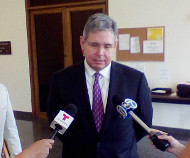8/4/2015
Illinois: Challenge Proceeds Against Chicago Red Light CamsJudge in Chicago, Illinois allows class action suit against red light camera program to proceed.

By The Expired Meter and DNAinfo Chicago
A Cook County, Illinois judge on Thursday refused to throw out a class action lawsuit challenging Chicago's lucrative red-light camera program. The lawsuit, Kata v. City of Chicago, was filed in 2012, but the latest hearing addressed the city's motion to have the case dismissed. After two and a half hours of sparring between the city's attorneys and those that brought the suit, Judge Rita M. Novak sided with the plaintiffs on several points but continued the city's motion until Oct. 6 to hear arguments on several other issues.
"We feel good, we feel optimistic," Patrick Keating, one of the lead attorneys for those seeking to get rid of the cameras, said outside the courtroom. "I think the court gave very careful consideration of the arguments. We're pleased the case continues and look forward to discussing the merits of the other issues."
Chicago's red-light camera program, which began in 2003, is the nation's largest with 302 cameras at 147 intersections. It has generated over $500 million in revenue for the city -- money opponents believe should be refunded to the drivers who paid the fines.
The lawsuit contends that in 2003, the city lacked the legal authority to create the photo enforcement program since there was no state law on the books allowing it at the time. Then, in 2006, when the Illinois General Assembly did pass a law enabling red light cameras, the Chicago city council never revised the municipal code to adopt the state law. The 2006 state law also restricted automated enforcement to just eight counties -- Cook, DuPage, Kane, Lake, Madison, McHenry, St. Clair and Will.
Opponents argue the state constitution prohibits any legislation that does not apply to the entire state. The lawsuit also goes after technical issues with the red-light camera program, saying the city does not always follow federal traffic safety standards which require traffic signals to have at least three seconds of yellow light time. The lawsuit points to over 77,000 red light camera tickets where the violation notice showed a yellow light duration between 2.0 to 2.9 seconds.
At Thursday's hearing, attorneys were only able to address some of the lawsuit's underlying legal issues. The city challenged the fact that one of the lead attorneys, Patrick Keating, filed a similar case,Keating v. City of Chicago, which reached the Illinois Supreme Court but was tossed last year. The case was dismissed because two of the seven judges, including Ann Burke, the wife of city council Finance Committee Chairman Ed Burke, recused themselves for undisclosed reasons. The remaining five justices split 3 to 2, which is short of the four votes needed for a decision.
City attorney Rebecca Hirsch argued that this case is so similar to the already-adjudicated Keating case, it should not be allowed to proceed. Judge Novak disagreed. The judge, however, did bar two of the five plaintiffs from being a part of the lawsuit due to statute of limitations issues.
On October 6, the parties will delve into whether the city had the legal authority to perform red-light camera enforcement without a state law enabling this type of enforcement and the issue of short yellow lights at red-light camera intersections.
The high-profile case got the attention of Citizens to Abolish Red Light Cameras, a group that has been working to end both the city's red-light and speed-camera programs. Protesters carrying signs stood outside the Daley Center before the hearing started to bring more attention to their cause. Mark Wallace, the group's leader, sat through the hearing. He was buoyed by the judge's ruling.
"This case lives to fight another day," Wallace said, laughing.
Ultimately, if this case survives the city's motion to dismiss and succeeds as a class action lawsuit, Keating believes the city would have to tear down the cameras and refund the hundreds of millions in fines it collected over the past 12 years.
"A ruling in our favor would result in the cameras having to come down," Keating said. "We're working to get refunds for the millions of people unfairly ticketed by the cameras."
City officials declined to comment on the case.
Detailed coverage of Chicago motoring issues can be found at The Expired Meter and at DNAinfo Chicago.


